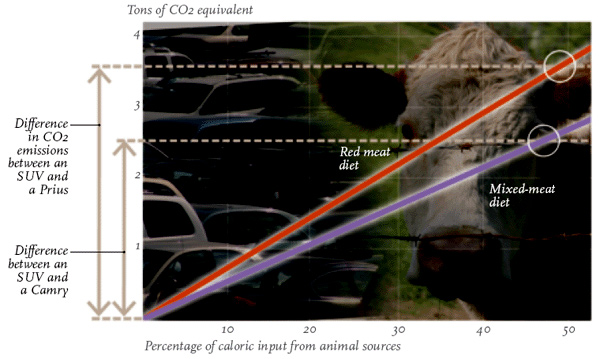|
||
      |
Fig.1
Recipe for global warming
Worried about global warming but not ready to give up driving? Maybe the closest wind farm is too far away, and you’re not wild about low-flow shower heads. Chicago geophysicists Gidon Eshel and Pamela Martin, AB’89, have another option for reducing greenhouse-gas emissions: eat less meat. In a report published in the April Earth Interactions (and in “Heated Discussion,” August/05), the researchers compared automobile emissions to greenhouse gases associated with vegetarian and meat diets (carbon-dioxide generated by farming equipment, trucking, and processing plants; and methane and nitrous oxide from livestock manure and fertilizers). Basing their study on a 3,774-calorie daily diet, they calculated that red-meat eaters getting 35 percent of their calories from animal sources including red meat, dairy, and eggs (the average is closer to 27 percent) rack up yearly emissions that, compared to a vegan diet, equal the difference between driving a Chevrolet Suburban and driving a Toyota Camry. At 50 percent, the gap widens to equal the difference between a Suburban and a hybrid Toyota Prius.
Moderate meat diets also scale back the emissions footprint. Using data from the UN Food and Agricultural Organization, Eshel and Martin determined that a mixed-meat diet, which combines red meat with poultry and fish, matches the emissions disparity between a Suburban and a Camry when caloric intake from animal sources reaches 47 percent.
